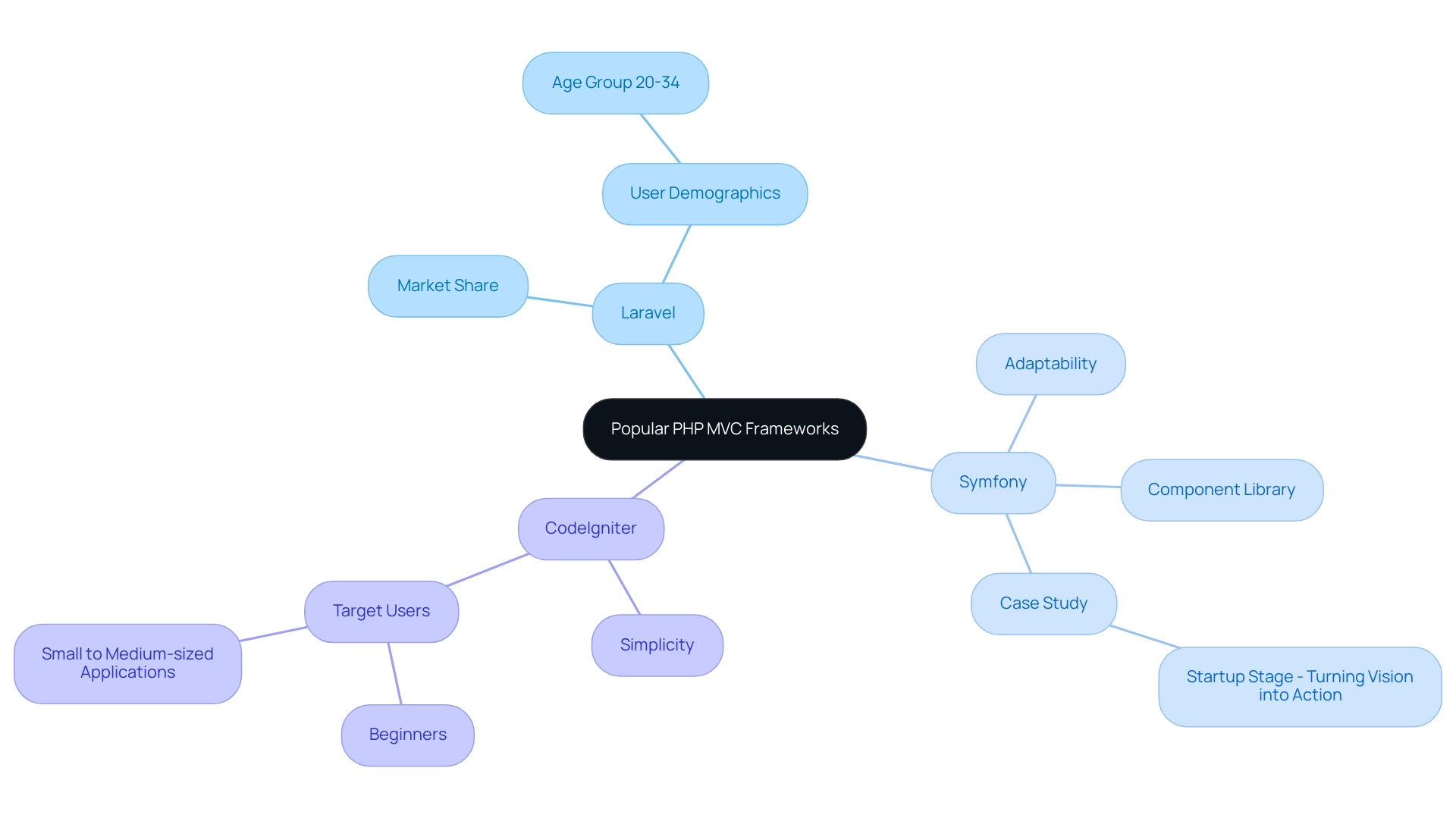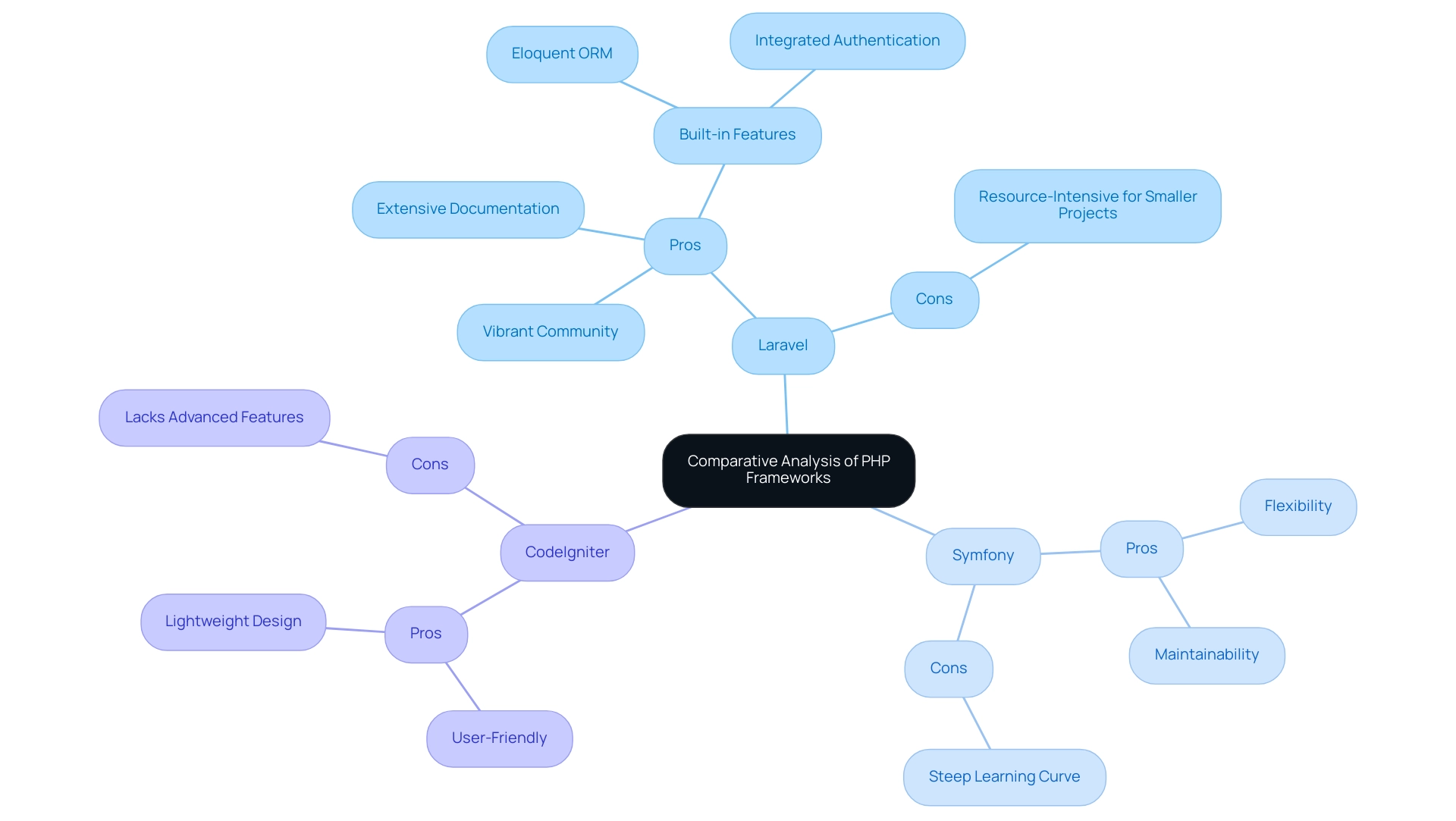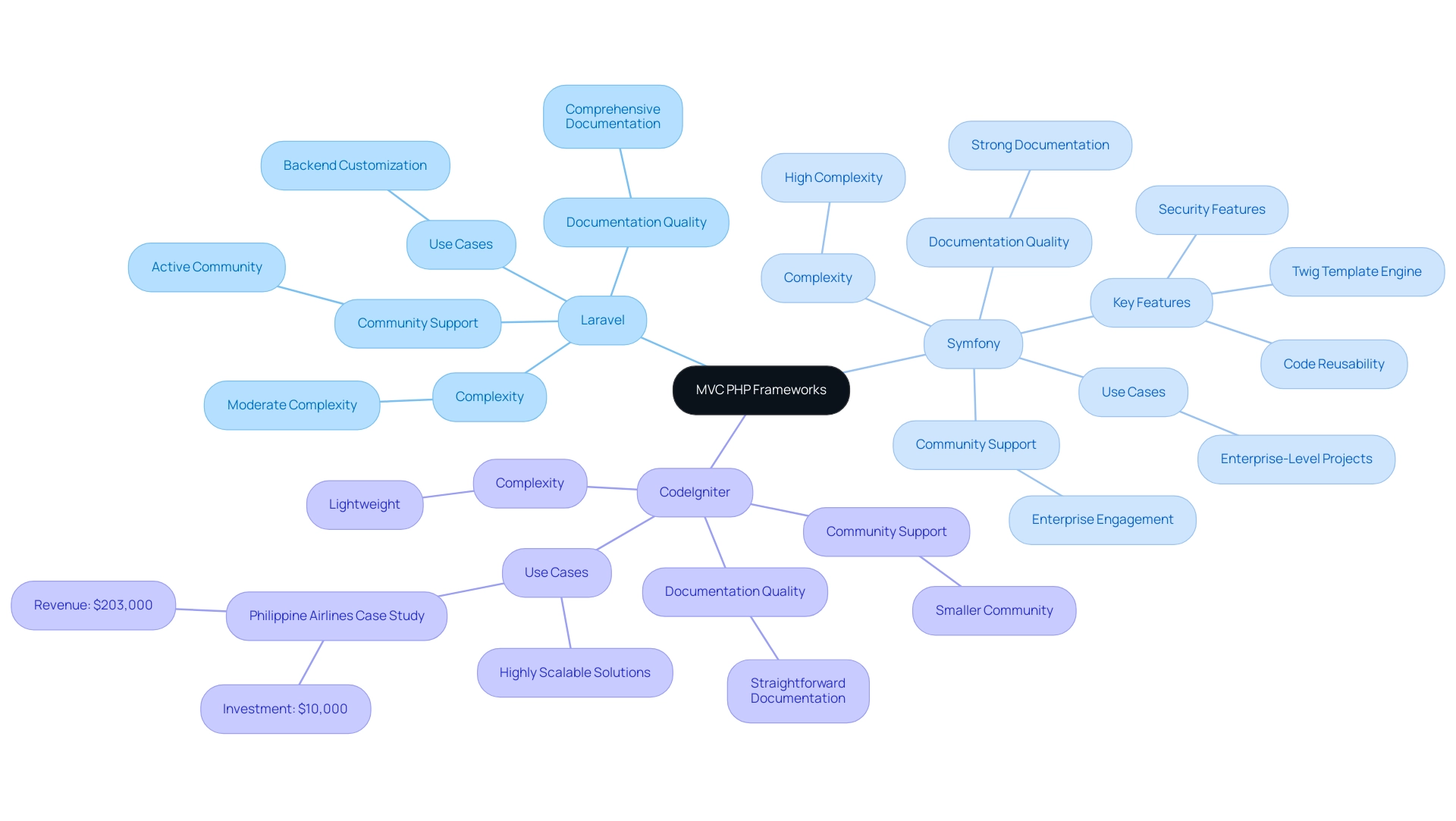Introduction
In the ever-evolving landscape of web development, the choice of a PHP MVC framework can significantly influence the efficiency and success of projects. Laravel, Symfony, and CodeIgniter stand out as the frontrunners, each bringing unique strengths that cater to different development needs.
- Laravel captures attention with its elegant syntax and robust ecosystem, making it a go-to for developers seeking rapid, high-quality web applications.
- Symfony’s flexibility and extensive component library empower teams tackling complex enterprise-level projects.
- For those just starting out or working on smaller applications, CodeIgniter offers a lightweight and user-friendly option.
As the demand for PHP frameworks continues to rise, understanding the features, benefits, and community support of these frameworks becomes essential for developers aiming to maximize productivity and achieve their project goals.
Overview of Popular PHP MVC Frameworks: Laravel, Symfony, and CodeIgniter
Among the leading mvc php frameworks, Symfony and CodeIgniter each provide unique benefits suited to particular development requirements. This framework stands out for its elegant syntax and robust features, making it a preferred choice for modern web applications that demand rapid development without sacrificing quality. Recent trends indicate that this framework has garnered a significant following, with 70% of its users aged between 20 to 34, showcasing its popularity among the younger generation of programmers.
Furthermore, statistics for 2024 reveal that Laravel holds a substantial market share among mvc php frameworks, affirming its leading position in the industry. Symfony, known for its adaptability and vast component library, is perfect for intricate enterprise-level projects, enabling developers to create scalable and maintainable software. A notable case study is the 'Startup Stage - Turning Vision into Action,' which illustrates how entrepreneurs leverage Symfony to refine their products based on customer feedback, moving from ideation to execution effectively.
On the other hand, CodeIgniter appeals to those seeking simplicity and ease of use, making it particularly suitable for beginners and small to medium-sized applications. As Sri Narayan Shukla, CEO of Singsys, aptly notes, 'As we will step into 2024 in a few months, the demand for PHP remains steadfast, a testament to its enduring relevance.' This emphasizes the essential role of PHP in contemporary IT innovation and highlights the significance of choosing the appropriate mvc php frameworks to maximize efficiency and productivity.

Key Features and Strengths of Laravel, Symfony, and CodeIgniter
The framework is celebrated for its robust ecosystem, which includes key features such as:
- Eloquent ORM for efficient database management
- The Blade templating engine for streamlined view rendering
- Built-in authentication capabilities that simplify the development process
Significantly, over fifty percent of programmers utilizing PHP choose MVC PHP frameworks as their primary tool for web development, indicating its extensive acceptance. Projections indicate that by the end of 2024, over 1.5 million websites will be created using Laravel across various sectors, including e-commerce and healthcare.
This growth underscores its strength in environments that demand customization, data protection, and security. In contrast, Symfony is characterized by its modular architecture, allowing programmers to choose only the components they require. This flexibility not only enhances efficiency but also supports scalability for larger projects and long-term goals.
Expert Fabien Potencier, the creator of Symfony, emphasizes its significance by stating,
Symfony is an open-source PHP structure established in 2005 and backed by SensioLabs.
Moreover, CodeIgniter offers a lightweight structure option defined by minimal configuration, allowing it to be remarkably easy to set up and deploy for individuals seeking rapid implementation. Notably, CodeIgniter allows API development using regular controller methods, while another framework offers a robust API handling capability with the Passport package for secure authentication.
Each MVC PHP framework's distinct features enable creators to make informed decisions tailored to specific project requirements, ultimately driving better outcomes. This framework is particularly suitable for small to medium-sized businesses and faster development, while Symfony aligns better with larger projects and long-term goals.
Pros and Cons of Each Framework: A Comparative Analysis
Laravel stands out due to its vibrant community and extensive documentation, which significantly assist programmers in their projects. Its built-in features, such as Eloquent ORM and integrated authentication, enhance productivity, although it can be resource-intensive for smaller projects. Gianclaudio Oliveira notes, 'Laravel is far away better.
It is better structured, more flexible and its tools are more complete, friendly and well-planned.' In contrast, Symfony is praised for its flexibility and maintainability, offering programmers the tools to create scalable applications; however, its steep learning curve can be daunting for newcomers.
CodeIgniter, known as one of the MVC PHP frameworks with its MVC architectural pattern and lightweight design, offers a user-friendly framework, making it an excellent choice for beginners.
Yet, it falls short when compared to other frameworks, lacking many advanced features that seasoned programmers might seek. Additionally, the PHP community is large and supportive, fostering an environment of learning and knowledge-sharing that particularly benefits users of the framework.
Understanding these pros and cons enables professionals to make informed decisions that align with their project requirements and team capabilities, ensuring optimal outcomes.

Community Support and Documentation: How Each Framework Stands
Laravel stands out with its extensive, active community and comprehensive documentation, significantly simplifying the problem-solving process for programmers. This framework's robust support network ensures that creators can readily access solutions and examples to enhance their projects. Symfony, known for its open-source nature, boasts strong documentation and community engagement, particularly within enterprise-level projects.
Its well-organized structure, code reusability, security against attacks, and the use of a Twig template engine further enhance its appeal. However, its complexity can sometimes delay rapid support, which may challenge developers seeking immediate assistance. On the other hand, CodeIgniter, while benefiting from a smaller community, provides straightforward documentation that caters effectively to beginners.
As noted, CodeIgniter is lightweight, making it a go-to for highly scalable solutions. Remarkably, Philippine Airlines Inc effectively created a boutique website using CodeIgniter, funding it with $10,000 and generating sales revenue of $203,000, demonstrating the utility of the system. The varying levels of community support and documentation quality significantly impact the overall developer experience with MVC PHP frameworks, making these factors essential considerations for choosing a development tool.
Recent evaluations highlight the importance of MVC PHP frameworks in the 2024 landscape, revealing that the strength of community support and documentation remains pivotal for successful project execution. Furthermore, a case study contrasting one framework and CodeIgniter demonstrates that the former provides a pre-defined architecture for easier backend customization, while CodeIgniter excels in testing for scalable systems, further contextualizing the discussion.

Performance and Scalability: Evaluating Framework Efficiency
When assessing performance, this framework excels in speed for small to medium projects, yet it can experience slowdowns with complex queries due to its extensive features. As Muzammil K., Marketing Manager at Aalpha Information Systems, notes, "The most significant benefit of Laravel is that you may avoid writing excessively complex and lengthy code," which underscores its efficiency. In contrast, Symfony's modular architecture provides significant optimization opportunities, making it particularly suitable for large-scale systems that experience high traffic.
CodeIgniter, launched in 2006, is renowned for its rapid execution and minimal resource consumption, positioning it as an optimal choice for projects where performance is paramount. Comprehending the scalability of mvc php frameworks is essential for programmers aiming to build resilient software that can adjust to growing user demands. Recent benchmarks highlight that while CodeIgniter offers speed, its lack of advanced features can limit its functionality for larger projects.
Thus, analyzing real-world uses of Laravel and Symfony, as discussed in the case study examining their effectiveness in diverse business scenarios, can provide insight into their effectiveness. Additionally, considering the best managed cloud hosting experience is essential for developers working with mvc php frameworks, as it directly impacts the performance and scalability of applications built on these frameworks.
Conclusion
The choice of a PHP MVC framework is pivotal in the web development landscape, with Laravel, Symfony, and CodeIgniter each offering distinct advantages tailored to various project requirements. Laravel's elegant syntax and robust ecosystem make it a preferred option for developers seeking rapid development and high-quality web applications. Its growing popularity, particularly among younger developers, underscores its relevance in the industry. Symfony, with its flexible architecture and extensive component library, is ideal for complex, enterprise-level projects, demonstrating its capability to support scalability and maintainability. Meanwhile, CodeIgniter provides a lightweight and user-friendly framework, making it an excellent starting point for beginners and suitable for smaller applications.
Understanding the pros and cons of each framework is essential for making informed decisions that align with specific project goals.
- Laravel's vibrant community and extensive documentation enhance productivity, while
- Symfony's flexibility caters to more intricate projects despite a steeper learning curve.
- CodeIgniter's simplicity serves well for straightforward applications but may lack advanced features sought by experienced developers.
Each framework's community support and documentation quality further influence the developer experience, emphasizing the importance of these factors in selecting the right tool for the task.
Ultimately, the decision to choose between Laravel, Symfony, and CodeIgniter should be guided by the specific needs of the project, the team's expertise, and the desired outcomes. As the demand for PHP frameworks continues to grow, leveraging the strengths of these frameworks can significantly enhance productivity and efficiency in web development, paving the way for successful project execution and innovation in the digital landscape.
Frequently Asked Questions
What are the main benefits of using Symfony as a PHP framework?
Symfony is celebrated for its elegant syntax, robust features, adaptability, and vast component library, making it ideal for intricate enterprise-level projects and scalable, maintainable software.
How popular is Laravel among PHP frameworks?
Laravel holds a substantial market share among MVC PHP frameworks, with a significant following among younger programmers, particularly those aged 20 to 34.
What key features does Laravel offer?
Laravel includes features such as Eloquent ORM for efficient database management, the Blade templating engine for streamlined view rendering, and built-in authentication capabilities that simplify the development process.
What type of projects is Symfony best suited for?
Symfony is best suited for complex enterprise-level projects that require scalability and maintainability.
How does CodeIgniter differ from Symfony and Laravel?
CodeIgniter is known for its simplicity and ease of use, making it particularly suitable for beginners and small to medium-sized applications. It features a lightweight structure and minimal configuration for rapid setup.
What are the future projections for Laravel's usage?
Projections indicate that by the end of 2024, over 1.5 million websites will be created using Laravel across various sectors, including e-commerce and healthcare.
What is the significance of PHP in the current development landscape?
The demand for PHP remains steadfast, highlighting its enduring relevance and essential role in contemporary IT innovation.
How does Symfony's architecture support project development?
Symfony's modular architecture allows programmers to select only the components they need, enhancing efficiency and supporting scalability for larger projects and long-term goals.
What is the primary audience for CodeIgniter?
CodeIgniter appeals to those seeking simplicity, making it particularly suitable for beginners and developers working on small to medium-sized projects.
How does the choice of an MVC PHP framework impact project outcomes?
Each MVC PHP framework has distinct features that enable developers to make informed decisions tailored to specific project requirements, ultimately driving better outcomes.




